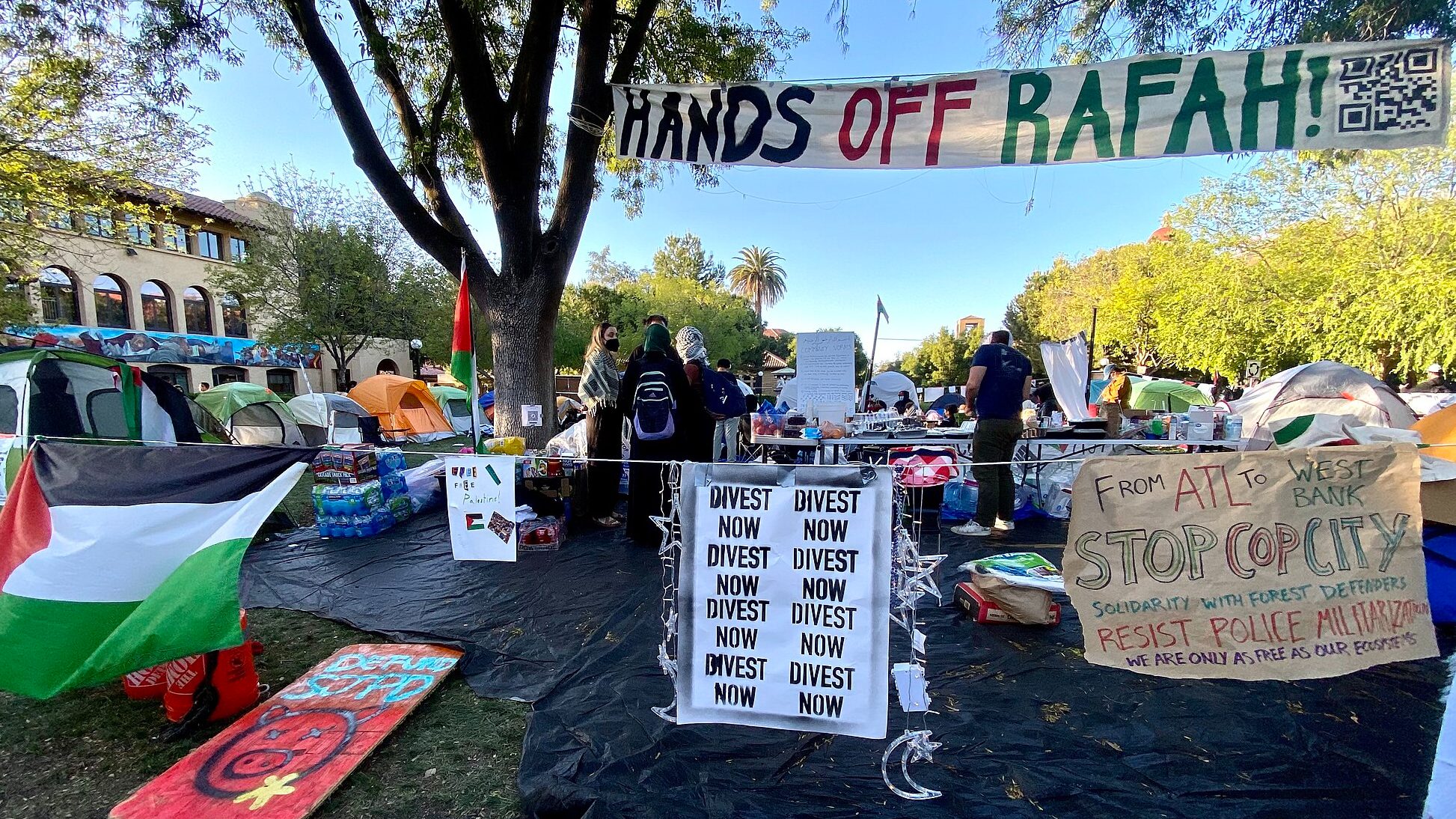The police crackdowns on student demonstrators pressing for an end to Israel’s war on Gaza have grabbed the headlines, in some cases diverting the public’s focus from the plight of the Palestinians themselves, who continue to be killed in large numbers even as they are deprived of basic necessities. It should be possible to cover both developments, with the situation on the ground in Gaza front and center. And there needs to be a strong pushback against the smear tactics that seek to portray a whole movement for justice as antisemitic.
Underlying these larger issues are the demands from student activists that their universities divest from companies with ties to Israel. This is not a new tactic. Divestment has a long, rich history, not only to publicize critical issues but as an effective tool for bringing about change.
A case in point is the campaign — mostly carried out in the 1970s and 1980s — to get universities to divest their holdings in companies involved in propping up the apartheid regime in South Africa, through investments, a corporate presence in the country, or bank loans to the South African government. The campaign fueled a new generation of student activism, elevated the visibility of the broader anti-apartheid movement, won divestment battles at some major universities, and reinforced the broader divestment movement that targeted state and local governments and pension funds.
In 1985, Columbia University, currently a site of strong opposition to Israel’s devastating war on Gaza, became the first major academic institution to fully end apartheid-linked investments after two rounds of divestment activity. A year later, Congress passed comprehensive sanctions on South Africa, overriding President Ronald Reagan’s veto in the process.
Increased Visibility
But even when they don’t win their demands, divestment campaigns can make social justice issues more visible and highlight the roles of the individuals and institutions that profit from repressive policies. Exposing those ties requires research, and today’s student divestment campaigners have excellent resources available to support their efforts.
For starters, the American Friends Service Committee has a section of its website devoted to “companies profiting from Israel’s 2023-2024 attack on Gaza.” It lists nearly four dozen companies that supply weapons or other military support to Israel, accompanied by detailed descriptions of the weapons they make that have been supplied to the Israeli Defense Forces.
Divestment has a long, rich history, not only to publicize critical issues but as an effective tool for bringing about change.
There is also a history of student groups doing their own extensive research in support of divestment efforts. Members of Women for Weapons Trade Transparency at the Center for International Policy started out in their chosen field by running a sophisticated campaign designed to get the University of Texas/Texas A&M’s UTIMCO to divest from major weapons firms like Lockheed Martin. A central tool of the campaign was a comprehensive report on weapons manufacturer holdings of the university’s investment fund. They identified $52.5 million in university investments in a wide range of military contractors including Lockheed Martin, Northrop Grumman, Boeing, HII (formerly Huntington Ingalls), and Raytheon (now RTX).
“War Profiteering”
Organizations such as Dissenters, a youth anti-militarism group founded in Chicago that now has student chapters around the country, are looking to make these research tools available for student groups.
Last October, after the start of the Israeli attacks on Gaza, Dissenters teamed up with the research group Lil Sis to do a detailed webinar on “War Profiteering on Campus: How to Research Corporate Backers of War and Militarism at Your College.” The session covered not only divestment-related research but also a myriad of other university ties to militarism, from the presence of arms industry executives as college trustees to enabling recruitment of students into the arms industry.
The session details how students can use ProPublica’s nonprofit explorer and the Securities and Exchange Commission EDGAR database to conduct their own research on university investments in stocks, mutual funds, and for-profit partnerships. Once they have a mutual fund ticker symbol, they can enter it into the Investigate Database and see which companies with ties to Israel that fund invests in.
Student groups are also drawing from the College Foreign Gift and Contract Report website. The database details contributions and partnerships between foreign countries and American universities, including high-value contracts between prominent schools such as Cornell University and the Israeli Ministry of Defense.
There are also billions of dollars worth of university research contracts from US government agencies that go toward developing weapons of war. The International Campaign to Abolish Nuclear Weapons’ Schools of Mass Destruction project hosts a website detailing 50 schools facilitating research and design of nuclear weapons. Israel possesses nuclear weapons, and Israeli Heritage Minister Amihai Eliyahu even suggested that the nuclear option could be “one way” to eliminate Hamas.
Lack of Transparency
With a lack of transparency from university administrations, student groups are using these resources to investigate and unpack the knotty relationships between their tuition dollars and Israel’s war in Gaza. And at some universities, student demonstrators are already seeing an impact.
At Northwestern University, demonstrators agreed to pack up their encampment, and the administration agreed to disclose school investments to students who request such information, among other conditions. On Tuesday, Brown University reached a deal with demonstrators to end their encampment in an exchange for the Corporation of Brown University’s vote on a divestment initiative in October.
Whether current student efforts succeed in winning divestment commitments from a significant number of universities, the current demonstrators have already put the issue of corporate connections to Israel’s military machine on the public agenda in a way like never before. And there is a possibility that their efforts will have a ripple effect and stimulate divestment activities on the part of financial institutions and state and local governments, as occurred during the South Africa divestment movement of the 1970s and 1980s.
If nothing else — and this is no small thing — the current divestment campaign sheds light on how economic interests help shape foreign and military policies, often to the detriment of the broader public. Confronting those forces must be part of any successful effort to promote a foreign policy that is responsive to the public interest rather than narrow special interests.














